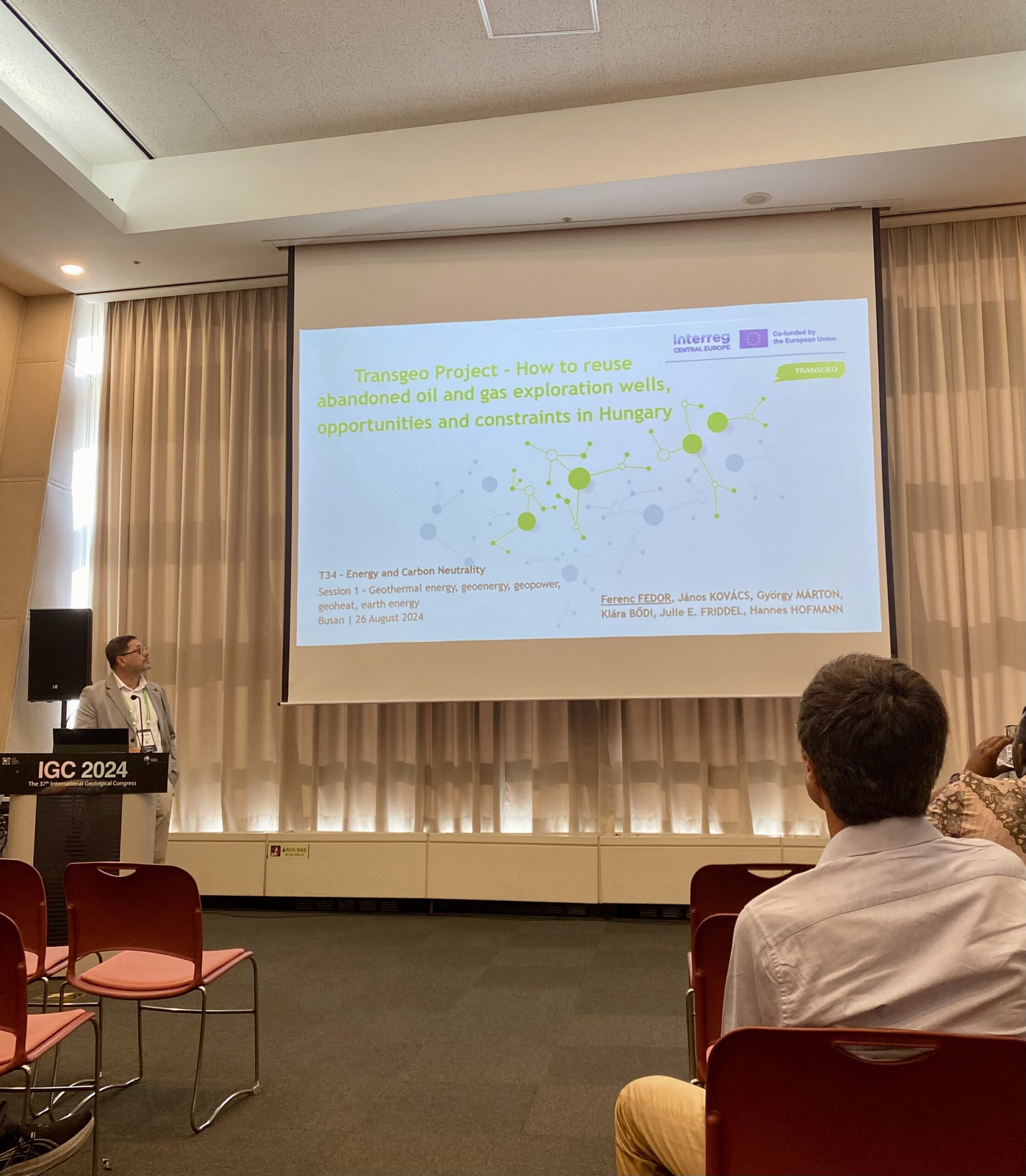The International Geological Congress (IGC) is a premier global event in geosciences, held every four years to bring together researchers, professionals, and industry leaders. The 37th IGC took place at BEXCO, a renowned convention center in Busan, South Korea, in August 2024. At this prestigious event, Dr. Ferenc Fedor and the PhD student Catarina Castro, active members of the project, from the University of Pécs in Hungary, had the opportunity to showcase the TRANSGEO project, while engaging with the global scientific community to exchange knowledge and explore potential collaborations.
Dr. Ferenc Fedor made significant contributions to the congress through two key presentations. His talk, “TRANSGEO Project – How to Reuse Abandoned Oil and Gas Wells: Opportunities and Constraints in Hungary,” discussed essential approaches to repurposing decommissioned oil and gas wells for geothermal energy extraction in Central Europe, the core objective of the TRANSGEO project. Additionally, Dr. Fedor presented “Micro CT and NMR Studies in the Very Compact Boda Claystone, in Connection with the Hungarian HLW Project,” which shed light on the potential use of claystone for safe high-level nuclear waste disposal in Hungary. Based on the principles presented in the latter presentation, microCT studies will also be carried out in the Szentes area, in connection with Ms Castro’s PhD work.
Catarina Castro delivered an insightful presentation titled “Enhancing Geothermal Resource Assessment: Well-correlation and Analysis of Depositional Facies in the Szentes Region, Hungary.” Her work, as part of the larger TRANSGEO project, focused on improving the assessment of geothermal resources through detailed well-correlation and facies analysis in the Szentes region. Both their presentations were well received, and valuable feedback from the international audience will help to further refine this ongoing research and project.
Péter Koroncz, PhD student, not funded by the TRANSGEO project, but related to the Szentes area, gave a presentation entitled “Experimental investigation of formation damage potential during thermal water injection on Upper Miocene (Pannonian) sandstones in the Szentes geothermal field, Hungary”.
Beyond their own contributions, Dr. Fedor Ferenc and Catarina Castro actively participated in several impactful posters and presentation sessions. These included “A Global Energy Outlook: Implications for Geothermal Energy” by Richard J. Chuchla, from the University of Austin, in the United States, which explored geothermal energy’s role in the global energy transition, “Heat Extraction Performance and Seismic Potential Estimation of Horizontal Well Doublets in Enhanced Geothermal Systems,” by Wei Jiang, from the Chengdu University of Technology, in China, which focused on optimizing heat recovery and addressing seismic risks in geothermal systems, and the “Characterizing Geothermal Heat Pump Systems in Relation to the Thermal Properties of Different Rocks,” by Youngjin Kim, from the Daesung heatenersy Company in South Korea, which emphasized how rock composition affects geothermal system performance. Also very interesting was the poster of GEODEATLAS.nl “A web-based GIS platform to support the subsurface geo-energy decision-making process”, whose experience could help to achieve the goals of TRANSGEO.
Their presence at the IGC not only highlighted the University of Pécs and the TRANSGEO project’s contributions to geothermal research but also strengthened their global network of experts in the field. Through active engagement with peers and leading figures in geothermal energy, Dr. Fedor and Catarina Castro fostered connections that will be instrumental in future collaborations and advancements in sustainable energy research.
